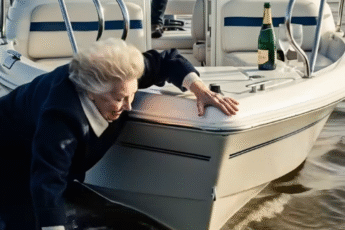At my baby shower, two weeks before my life imploded, my sister-in-law, Sandra, cornered me by the gift table. My husband, Mark, and I had just announced the name we’d chosen: James Patrick. James, for my late grandfather who’d taught me how to fish; Patrick, for Mark’s brother, a Marine who never came home from Afghanistan.
A strange, haunted look flickered across Sandra’s face. “James Patrick?” she repeated, her voice tight. She pulled me aside, her grip on my arm surprisingly firm. “Where did you get that name? How did you know about James Patrick?”
Confused, I patiently explained the family connections, even pointing to the framed photos we’d set up on the mantel. But she wasn’t listening. Her eyes were wide, her questions growing more frantic. “But how did you know?” She left without even touching the cake I’d so carefully chosen. That night, she blocked us on every social media platform. We chalked it up to stress, some personal issue we weren’t privy to. We were wrong.
Two weeks later, at five in the morning, the world ended with a splintering crash. Pounding on our front door rattled the walls. Before Mark could even get his bearings, two officers with weapons drawn were in our bedroom, screaming commands. They separated us immediately. I watched, screaming, as they dragged my husband out in handcuffs, his face a mask of bewildered terror. Before I could process what was happening, I was being escorted to a squad car, an officer telling me it was “for the baby’s protection.”
That’s how I ended up here, eight months pregnant and handcuffed to a hospital bed. An officer named Mills sat in a chair by the door, his hand resting casually on the holstered weapon at his hip. He looked at me with a tired, cynical contempt, as if I were a particularly tedious piece of paperwork.
He slammed a folder down on the bedside table. “We know everything,” he said, his voice flat. He flipped it open. “James Patrick Murphy. Six years old, lives in Michigan. Your sister-in-law has provided extensive documentation of your… obsession with this child.”
“I don’t know any child,” I whispered, my voice trembling. “I don’t know what you’re talking about.”
“Shut up,” he snapped. He shoved a printed screenshot in my face. It was from a local parents’ group on Facebook, a post I’d made selling duplicate baby items from our registry. “These ‘duplicate packages’ you were selling. We know that’s code for twin babies. And these ‘buyers’ you mentioned? We know who you’re really selling to.”
The cuff bit into my wrist as my blood pressure monitor began to shriek, a frantic, high-pitched alarm. A nurse rushed in. “Her pressure is 180 over 120! The stress could cause a placental abruption!”
“She’s faking,” Mills said, not even glancing at the monitor. “They all do this.”
Just then, another officer, Lee, arrived with two grim-faced CPS workers in tow. “Your baby will be removed at birth,” Lee announced, as if discussing the weather. “You’ll never see it. That’s if you’re lucky and don’t get life without parole.”
“Please,” I sobbed, tears blurring their faces. “Sandra is lying. Those were registry gifts. We were just selling the extras.”
Lee smirked. “Your husband’s already confessed. Said it was all your idea, that you roped him into it to save himself.”
A sharp, stabbing pain seized my stomach, so intense it stole my breath. It felt like I was being torn in two. “Something’s wrong,” I gasped. “The baby…”
“Convenient timing,” Mills scoffed. “Sit still.”
The pain intensified, a relentless, white-hot agony. I felt a sudden, warm gush between my legs. “I’m bleeding,” I cried out, my voice raw with panic. “Please, help me.”
“You’re not bleeding,” Mills said, his voice laced with boredom. “Stop moving or we’ll add resisting arrest to the charges.”
The nurse, ignoring him, pulled back my blanket. She gasped, her hand flying to her mouth. “She’s hemorrhaging! Get Dr. Blake in here now!”
“I told you, she’s faking,” Mills insisted, but the nurse was already hitting the emergency button on the wall.
“She’s having a placental abruption!” the nurse screamed into the intercom. “This is life-threatening!”
Dr. Blake, a tall man with tired eyes, ran in, took one look at the blood pooling on the bed, and his face went white. “Jesus Christ, how long has she been bleeding?”
“Five minutes? Maybe ten? They wouldn’t let me check,” the nurse stammered.
“Prep an OR, now!” Dr. Blake roared. “We could lose them both!”
But as two more nurses rushed in to unhook my monitors, Officer Mills blocked the door. “She’s in custody. She stays here.”
Dr. Blake’s face contorted with a rage I’d never seen on a doctor. “Then you might as well sign their death certificates right now,” he snapped. “This is a medical emergency, not a negotiation.”
“Let me call my supervisor,” Mills said slowly, pulling out his phone as I writhed in agony.
“There’s no time!” Dr. Blake shouted.
“Protocol is protocol,” Mills replied, calmly dialing. The call went to voicemail. He began leaving a long, detailed message, his voice a drone against the symphony of my screams and the frantic beeps of the failing monitors. My vision was tunneling, the edges turning dark.
“Her pressure is dropping fast!” someone shouted.
“Still waiting for authorization,” Mills said into the phone.
The head nurse, a formidable woman with graying hair, strode forward, holding a tablet. “Hospital policy, page 47, section 3, states that custody transfers to medical authority during an emergency surgical procedure. You are now interfering with federal medical guidelines.”
“This looks fake,” Mills said, squinting at the screen. “Could be edited.”
“It’s from the federal website, you imbecile!” Dr. Blake bellowed.
They finally started wheeling my bed down the hall, the officers jogging alongside us. “Watch for her to run,” Mills said to Lee. “They sometimes have accomplices dressed as medical staff.”
“She’s hemorrhaging!” Dr. Blake yelled back over his shoulder. “She couldn’t run to the bathroom, let alone out of the hospital!”
In the pre-op bay, the anesthesiologist took one look at the handcuffs still shackled to my wrist and recoiled. “Absolutely not. These come off for surgery.”
“She’s a flight risk,” Mills insisted.
The anesthesiologist stared at him, incredulous. “She’s eight months pregnant, bleeding out, and about to be unconscious. Where, precisely, did you imagine she might go?” He glanced at my chart. “You’ve had her blood pressure at stroke levels for how long? Are you actively trying to end her life?”
Mills wouldn’t budge. He demanded an officer remain in the operating room. “I need visual confirmation she doesn’t escape.”
That was the last straw. The anesthesiologist picked up the phone. “I need hospital administration and security in OR Three. Now. We have federal officers interfering with emergency medical treatment and attempting to dictate surgical procedure.”
The hospital administrator, a sharp woman in a business suit, arrived, took in the scene in a single glance—me, pale and bleeding, Mills with his arms crossed—and turned to the officers. “You can stand outside the OR doors, or I will be calling the Office of Professional Responsibility and filing a report for attempted murder by denial of medical care. Your choice.”
As they wheeled me through the doors, Mills pointed a finger at me. “When she wakes up—if she wakes up—we’re charging her with everything. The baby goes straight to CPS. No contact.”
Then, everything went black.
I woke up to a searing fire in my abdomen and the blinding fluorescent lights of a recovery room. A word, a single, desperate question, clawed its way up my raw throat. “Baby?”
A nurse appeared, her expression a painful mix of relief and sorrow. “He’s alive,” she whispered. “But he’s in the NICU. He’s very small.”
I tried to sit up, a primal need to see my son overriding the agony, but she gently pressed me back down. “You can’t,” she said softly. “CPS has taken custody. There’s a no-contact order.”
The words were gibberish. My son was alive, just rooms away, but he might as well have been on the moon. The nurse, while pretending to adjust my IV, leaned in close. “I documented everything,” she whispered, her voice fierce. “How they delayed your care for almost twenty minutes while you were bleeding out. It was criminal.” She slipped a small piece of paper with her phone number under my blanket. “If you need a witness, I’ll be there.”
A CPS worker entered then, a woman with a plastic smile and cold eyes. She placed a stack of forms on my table. “Just some routine paperwork for the baby’s care,” she chirped. “If you’ll just sign here.”
“What does it say?” I asked, my voice hoarse.
“Oh, just standard procedure. We need to get it done.”
A cold dread washed over me. “I’m not signing anything without a lawyer.”
Her smile vanished. “Refusing to cooperate will be documented and used against you in court,” she sneered, and stormed out.
Hours later, Mark appeared in the doorway. His left eye was swollen shut, a grotesque purple bloom on his face, and his wrist was in a brace. He rushed to my side, and we clung to each other, our sobs the only sound in the sterile room. He swore he never confessed, that Lee had lied. He told me they’d worked him over in the interrogation room when he refused to play along with their story.
We were still holding each other when an officer came in to enforce the no-contact order. Not just for the baby, he explained, but for all parties involved. Mark had to leave immediately or be arrested again. He kissed my forehead, whispered, “I love you,” and was gone.
The days that followed were a waking nightmare. My milk came in, a painful, physical reminder of the baby I couldn’t hold or feed. I would stand in the shower, sobbing, as I expressed the milk, watching it circle the drain. Three days after my discharge, a judge granted me one hour of supervised NICU visitation per day.
The first time I saw him, my heart shattered. James was impossibly tiny in his incubator, a fragile bird tangled in a nest of wires and tubes. A CPS worker stood behind me, her pen scratching on a clipboard, documenting my every move as a nurse carefully placed my four-pound son on my chest.
The NICU nurse waited for the CPS worker to step out before whispering to me that James had been crying almost non-stop since birth. “But the second I put him in your arms,” she said, her eyes shining, “he went completely silent. His breathing evened out. He knows his mama.”
That night, my mother-in-law called, weeping. She told me the truth about Sandra. Four years ago, she’d had a miscarriage at five months. She had already decorated the nursery, already chosen a name. The name was James Patrick. She had never gotten help, never processed the grief. Hearing us announce the name had fractured something in her mind. She wasn’t just accusing us; in her broken, grieving heart, she believed we had somehow, literally, stolen her lost son.
The system didn’t care. It ground on, relentless and unfeeling. The medical bills topped six figures. Insurance refused to pay. Mark was fired. We sold my grandmother’s wedding ring to pay for the court-mandated psychological evaluations, which CPS then used to argue my “severe PTSD” made me an unfit mother.
During one visit, James stopped breathing. He turned blue in my arms. The CPS worker froze, but my training kicked in. I performed infant CPR, my hands shaking, until he coughed and cried. Her report stated I was “aggressive with the baby” and had performed “unnecessary medical procedures.” My visitation was cut to thirty minutes.
The final, crushing blow came when James was stable enough to leave the NICU. He didn’t come home. He went to a foster family. Our visits were twice a week, in a sterile government room with cameras watching. He didn’t know us. He would cry and reach for the caseworker. Their notes said we “failed to bond.”
Then the nurse, Sarah, the one who’d slipped me her number, contacted our lawyer. She’d been fired shortly after my surgery, but she had a recording. On her phone, she had captured Officer Mills talking to Lee in the hallway. She’d recorded him admitting he knew the charges were bogus from the start, but they had to follow through or they’d “look stupid.” The recording was crystal clear. It even captured him laughing as he said we’d never see our baby grow up.
Our lawyer played it for the prosecutor the next morning. I watched the color drain from his face. Within hours, federal agents arrested Mills at his desk. The case collapsed like a house of cards. A furious judge ordered James returned to us by 8 p.m. that night or he would start jailing CPS supervisors for contempt of court.
At 7:45 p.m., the foster mother brought our five-month-old son to our door. She was crying. “I always knew he belonged with you,” she said. James didn’t know who we were. He cried when I held him, turning his face away, reaching for the only mother he’d ever known as she walked away.
That first night, I just sat in the rocking chair in his nursery, holding him while he slept, terrified that if I put him down, they would take him again. Mark sat on the floor beside me, and we cried in silence, strangers to our own son.
The civil lawsuit settled two weeks later. The money would cover the mountain of debt and James’s future therapy for the developmental delays caused by the birth trauma. Mills was sentenced to eighteen months in federal prison. It wasn’t enough, but it was something.
Slowly, painstakingly, we began to heal. James learned our faces, our voices. He learned our smell. Then one morning, when I went to get him from his crib, he looked at me, a real, knowing smile spreading across his face. He lifted his chubby arms. “Mama,” he said, clear as day.
I sank to the floor, the sound of that one perfect word washing over me, a fragile, hard-won sunrise after the longest night of our lives.





